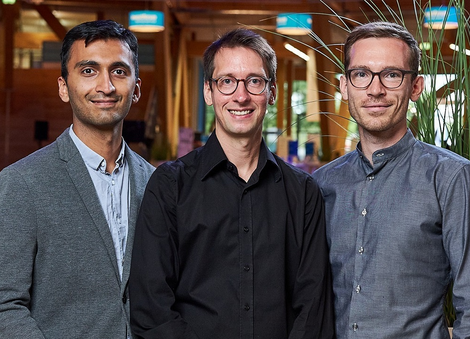Look Into My Eyes

Is there a way to optimize the online customer journey and make messages on websites more reader-friendly? Startup Adsata based at the Center of Excellence MMZ Middle German Multimedia Centre in Halle (Saale) has developed an as-yet unrivalled program which does exactly that, using webcam eye tracking technology and data protection compliant analytics that help improve marketing.
Digital marketing is more popular than ever – not least because of the pandemic. But does it actually achieve its desired aim? Any business that has an online store, places digital ads, publishes online newsletters or communicates via its own website can now look forward to a service that will help optimize the customer focus of its online presence. Taimur Khan (27) and Jonas Kühl (33) from Halle (Saale) developed an eye tracking program for the internet – a piece of software that follows eye movements as well as slight movements of the head when someone is looking at a web page on their computer. It sounds like espionage, but according to its developers, it is anything but. Their groundbreaking innovation is called Adsata. As to why the pair chose this coined term for the name of the IT company they set up in 2018, Taimur Khan explains that “it’s easy to pronounce in any country” and also illustrates their vision for the business: to become a global brand. “Adsata is still the only provider in Germany that can guarantee reliable privacy compliance with the General Data Protection Regulation,” says Khan.
Born in Pakistan, Khan studied Geosciences in the USA while pursuing his other passion – programming – to help out a friend who is a marketing expert. The two came up with the conceptual basis for Adsata together. When Khan came to Martin Luther University Halle Wittenberg (MLU) for a research semester, climate change was not the only thing on his mind. The Adsata idea journeyed with him to Halle and took on a new form. “Taimur approached the uni’s startup service and asked if I would like to assist him with the implementation,” explains Jonas Kühl, a Cultural Sciences and Economics graduate who, in his role as a consultant, had already helped many startups take their first steps. Inspired by the whole idea of webcam eye tracking, he decided to join forces with Khan – the timing is right because the data privacy technologies that make secure eye tracking feasible are already developed, he explains.
Event detection – enhanced eye tracking
Putting it simply, the browser-based software converts a laptop webcam into a fully functional eye-tracking laboratory for images and entire websites. The software can detect, in real time, where users are looking at a given moment, how long they look at something and what route their eyes take. In this case, the users are testers who approach website operators independently.
“Our USP is not just the user interface for anonymous data collection but particularly the automatic analysis of the captured eye tracking data,” explains Taimur Khan, who goes on to say that the user behavior data enables website UX designers to improve pages accordingly. “It makes news portals and newsletters more reader-friendly, and online store offerings more customer-specific,” summarizes Jonas Kühl, who says that Adsata’s next pioneering technical service will be so-called “event detection.” “Our software will then be able to track events as well. In other words, the things that people click on and which windows they open.” He adds that “detailed analytics using eye tracking will help give online marketing professionals an even better understanding of people’s visual interactions with digital content.”
The brains behind the groundwork for this enhancement is Daniel Schreiber. While studying Computer Science at MLU, he approached Adsata with his innovative idea for event detection, i.e. mapping people’s gaze as it moves and stops. He wrote his bachelor’s dissertation based on Adsata as a use case. Based on his paper, the startup developed a module that detects how long an observer’s eyes remain fixated on an event.
Ready for market and in search of customers
“It will help give online marketing professionals an even better understanding of people’s visual interactions with digital content,” says Jonas Kühl, adding that Daniel Schreiber stayed on board at Adsata after graduating.
The startup is now a team of six Including the founders, with a collective skillset in software development, product design, data analytics and professional marketing. All of them joined Adsata straight from university. Taimur Khan and Jonas Kühl view their location at the center of a thriving academic scene as a definite advantage, but also the state-wide startup service and the MLU startup service. As a fledgling business they came to appreciate how easy it is to get things up and running in Saxony-Anhalt, with a high and effective level of support to help entrepreneurs get on their feet.
“After countless test versions, our webcam eye tracking is now market ready,” say Adsata’s founders excitedly. Taimur Khan is especially proud that the idea he first conceived in America has now “grown up” to be a successful company in Saxony-Anhalt. “Anyone who operates a digital business portal and has a pioneering spirit is a candidate to get involved and be among Adsata’s first customers,” he says.
Author: Kathrain Graubaum/IMG Saxony-Anhalt

Saxony-Anhalt relies on the innovative strength of young companies from the information and communications industry. Well over 2,000 innovative and in some cases internationally active ICT companies with around 16,000 employees covered by social insurance are currently based in the country. The majority of these companies are active in software development and IT services for other companies.
